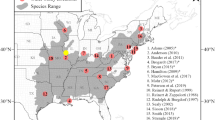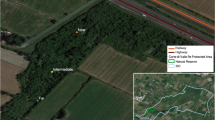Abstract
The impacts of tourism on wildlife have long been a concern in areas where ecotourism is a major industry. The issue is especially pressing in Antarctica, which has a rapidly growing tourism industry largely concentrated around penguin colonies on the Antarctic Peninsula. Guidelines developed by both the Committee for Environmental Protection and the International Association of Antarctica Tour Operators include measures to minimize wildlife impacts. In this study, we examined the relationship between physiologic stress in Gentoo Penguins (Pygoscelis papua) and tourism. Corticosterone is an adrenal glucocorticoid that has been shown in previous studies to increase in response to stressors such as low food availability, environmental conditions, as well as human visitation and proximity. Fecal glucocorticoids (FGM; primarily corticosterone and metabolites) were measured in Gentoo Penguin guano collected at 19 breeding colonies (n = 108, 3–10 samples per site) on the Antarctic Peninsula and the South Shetland Islands, representing a wide range of tourism visitation. We found a large degree of variation in FGM concentrations, and no relationship between FGM concentrations and number of tourists landed at that site. These results suggest that current tourism management guidelines on the Antarctic Peninsula are effective at preventing increased stress in Gentoo Penguins as measured by hormonal markers, and demonstrate the use of guano as a non-invasive, low-impact methodology for monitoring Gentoo Penguin stress.


Similar content being viewed by others
References
Angelier F, Moe B, Weimerskirch H, Chastel H (2007) Age specific reproductive success in a long-lived bird: do older parents resist stress better? J Anim Ecol 76:1181–1191. https://doi.org/10.1111/j.1365-2656.2007.01295.x
Barbosa A, de Mas E, Benzal J, Ines Diaz J, Motas M, Jerez S, Pertierra L, Benayas J, Justel A, Lauzurica P, Garcia-Pena FJ, Serrano T (2013) Pollution and physiological variability in Gentoo Penguins at two rookeries with different levels of human visitation. Antarct Sci 25:329–338. https://doi.org/10.1017/S0954102012000739
Bender NA, Crosbie K, Lynch HJ (2016) Patterns of tourism in the Antarctic Peninsula region: a 20-year analysis. Antarct Sci 28:194–203. https://doi.org/10.1017/S0954102016000031
Busch DS, Hayward LS (2009) Stress in a conservation context: a discussion of glucocorticoid actions and how levels change with conservation-relevant variables. Biol Cons 142:2844–2853. https://doi.org/10.1016/j.biocon.2009.08.013
Carlini AR, Coria NR, Santos MM, Libertelli MM, Donini G (2007) Breeding success and population trends in Adélie Penguins in areas with low and high levels of human disturbance. Polar Biol 30:917–924. https://doi.org/10.1007/s00300-006-0251-1
Cavigelli SA, Monfort SL, Whitney TK, Mechref YS, Novotny M, McClintock MK (2005) Frequent serial fecal corticoid measures from rats reflect circadian and ovarian corticosterone rhythms. J Endocrinol 184:153–163. https://doi.org/10.1677/joe.1.05935
Cobley ND, Shears JR (1999) Breeding performance of Gentoo Penguins (Pygoscelis papua ) at a colony exposed to high levels of human disturbance. Polar Biol 21:355–360. https://doi.org/10.1007/s003000050373
Cockrem JF (2013) Individual variation in glucocorticoid stress responses in animals. Gen Comp Endocrinol 181:45–58. https://doi.org/10.1016/j.ygcen.2012.11.025
Coetzee BWT, Chown SL (2016) A meta-analysis of human disturbance impacts on Antarctic wildlife. Biol Rev 91:578–596. https://doi.org/10.1111/brv.12184
Crosbie K (1999) Interactions between skuas Catharacta sp. and Gentoo Penguins Pygoscelis papua in relation to tourist activities at Cuverville Island, Antarctic Peninsula. Mar Ornithol 27:195–197
Culik B, Adelung D, Woakes AJ (1990) The effect of disturbance on the heart rate and behaviour of Adélie Penguins (Pygoscelisadeliae) during the breeding season. In: Kerry KR, Hempel G (eds) Antarctic ecosystems. Springer, Berlin, pp 177–182
Dunn MJ, Forcada J, Jackson JA, Waluda CM, Nicholl C, Trathan PN (2019) A long-term study of Gentoo Penguin (Pygoscelis papua) population trends a major Antarctic tourist site, Goudier Island, Port Lockroy. Biodivers Conserv 28:37–53. https://doi.org/10.1007/s10531-018-1635-6
Ellenberg U, Setiawan AN, Cree A, Houston DM, Seddon PJ (2007) Elevated hormonal stress response and reduced reproductive output in Yellow-eyed Penguins exposed to unregulated tourism. Gen Comp Endocrinol 152:54–63. https://doi.org/10.1016/j.ygcen.2007.02.022
Ellenberg U, Mattern T, Seddon PJ (2009) Habituation potential of Yellow-eyed Penguins depends on sex, character and previous experience with humans. Anim Behav 77:289–296. https://doi.org/10.1016/j.anbehav.2008.09.021
Fowler GS (1999) Behavioral and hormonal responses of Magellanic Penguins (Spheniscus magellanicus) to tourism and nest site visitation. Biol Conserv 90:143–149. https://doi.org/10.1016/S0006-3207(99)00026-9
Goutte A, Angelier F, Bech C, Clément-Chastel C, Dell’Omo G, Gabrielsen GW, Lendvai ÁZ, Moe B, Noreen E, Pinaud D, Tartu S, Chastel O (2014) Annual variation in the timing of breeding, pre-breeding foraging areas and corticosterone levels in an Arctic population of black-legged kittwakes. Mar Ecol Prog Ser 496:233–247. https://doi.org/10.3354/meps10650
Groscolas R, Lacroix A, Robin J-P (2008) Spontaneous egg or chick abandonment in energy-depleted King Penguins: a role for corticosterone and prolactin? Horm Behav 53:51–60. https://doi.org/10.1016/j.yhbeh.2007.08.010
Hockey PAR, Hallinan J (1981) Effect of human disturbance on the breeding behavior of Jackass Penguins Spheniscus demersus. S Afr J Wildl Res 11:59–62
Holmes ND (2007) Comparing king, gentoo, and Royal Penguin responses to pedestrian visitation. J Wildl Manag 71:2575–2582. https://doi.org/10.2193/2005-715
Holmes ND, Giese M, Achurch H, Robinson S, Kriwoken LK (2006) Behavior and breeding success of Gentoo Penguins Pygoscelis papua in areas of low and high human activity. Polar Biol 29:399–412. https://doi.org/10.1007/s00300-005-0070-9
Humphries GRW, Naveen R, Schwaller M, Che-Castaldo C, McDowall P, Schrimpf M, Lynch HJ (2017) Mapping application for penguin populations and projected dynamics (MAPPPD): data and tools for dynamic management and decision support. Polar Record 53:160–166. https://doi.org/10.1017/S0032247417000055
International Association of Antarctica Tour Operators (2018) Tourism statistics https://iaato.org/tourism-statistics.
Kitaysky AS, Piatt JF, Wingfield JC (2007) Stress hormones link food availability and population processes in seabirds. Mar Ecol Prog Ser 352:245–258. https://doi.org/10.3354/meps07074
Lynch HJ, Crosbie K, Fagan WF, Naveen R (2010) Spatial patterns of tour ship traffic in the Antarctic Peninsula region. Antarct Sci 22:123–130. https://doi.org/10.1017/S0954102009990654
Möstl E, Rettenbacher S, Palme R (2005) Measurement of corticosterone metabolites in birds’ droppings: an analytical approach. Ann N Y Acad Sci 1046:17–34. https://doi.org/10.1196/annals.1343.004
Nimon AJ, Schoter RC, Oxenham RKC (1996) Artificial eggs—measuring heart rate and effects of disturbance in nesting penguins. Physiol Behav 60:1019–1022
Plummer M (2003) JAGS: a program for analysis of Bayesian graphical models using Gibbs sampling. In: Proceedings of the 3rd international workshop on distributed statistical computing (DSC 2003), March 20–22, Vienna, Austria
R Core Team (2018) R: a language and environment for statistical computing. R Foundation for Statistical Computing, Vienna, Austria. https://www.R-project.org/.
Rich EL, Romero M (2005) Exposure to chronic stress downregulates corticosterone responses to acute stressors. Am J Physiol Regul Integr Comp Physiol 288:R1628–R1636. https://doi.org/10.1152/ajpregu.00484.2004
Spée M, Beaulieu M, Dervaux A, Chastel O, Le Maho Y, Raclot T (2010) Should I stay or should I go? Hormonal control of nest abandonment in a long-lived bird, the Adélie Penguin. Horm Behav 58:762–768. https://doi.org/10.1016/j.yhbeh.2010.07.011
Stonehouse B (1970) Geographic variation in Gentoo Penguins Pygoscelis papua. Ibis 112:52–57. https://doi.org/10.1111/j.1474-919X.1970.tb00075.x
Su Y-S, Yajima M (2015) R2jags: using R to run 'JAGS'. R package version 0.5-7. https://CRAN.R-project.org/package=R2jags.
Thierry A-M, Ropert-Coudert Y, Raclot T (2013) Elevated corticosterone levels decrease reproductive output of chick-rearing Adélie Penguins but do not affect chick mass at fledging. Conserv Physiol 1:007. https://doi.org/10.1093/conphys/cot007
Thierry A-M, Massemin S, Handrich Y, Raclot T (2013) Elevated corticosterone levels and severe weather conditions decrease parental investment of incubating Adélie Penguins. Horm Behav 63:475–483. https://doi.org/10.1016/j.yhbeh.2012.12.011
van Heezik Y, Seddon PJ (1990) Effect of human disturbance on beach groups of Jackass Penguins. South African Journal of Wildlife Research 20:89–93
Walker BG, Boersma PD, Wingfield JC (2005) Physiological and behavioral differences in Magellanic Penguin chicks in undisturbed and tourist-visited locations of a colony. Conserv Biol 19:1571–1577. https://doi.org/10.1111/j.1523-1739.2005.00104.x
Walker BG, Boersma PD, Wingfield JC (2006) Habituation of adult Magellanic Penguins to human visitation as expressed through behavior and corticosterone secretion. Conserv Biol 20:146–154. https://doi.org/10.1111/j.1523-1739.2005.00271.x
Young AM, Hallford DM (2013) Validation of fecal glucocorticoid metabolite assay to assess stress in the Budgerigar (Melopsittacus undulates). Zoo Biology 32:112–116. https://doi.org/10.1002/zoo.21041
Acknowledgements
We thank C. Foley and B. Gonçalves for help in field collection. We also thank Oceanites Inc. and One Ocean Expeditions for travel and field support and IAATO for detailed data on tourism activities.
Funding
Funding was provided by Oceanites, Inc., National Aeronautics and Space Administration Grant NNX16AO27H and National Science Foundation Award 1255058.
Author information
Authors and Affiliations
Contributions
M.A.L. and C.Y. collected data; M.A.O and N.H.A validated the assay for use in penguin samples; N.H.A. processed samples and calculated the final concentrations; M.A.L analyzed data; M.A.L, C.Y. and H.J.L formulated questions, and all authors contributed to the written manuscript.
Corresponding author
Ethics declarations
Conflict of interest
The authors declare that they have no conflict of interest.
Ethical approval
All applicable international, national, and/or institutional guidelines for the care and use of animals were followed. All procedures performed in studies involving animals were in accordance with the ethical standards of the institution or practice at which the studies were conducted (Stony Brook University Institutional Animal Care and Use Committee permit # 2011-1881-R1-6.19.20-BI, Antarctic Conservation Act permit #2016-013, United States Department of Agriculture permit #126,132).
Additional information
Publisher's Note
Springer Nature remains neutral with regard to jurisdictional claims in published maps and institutional affiliations.
Rights and permissions
About this article
Cite this article
Lynch, M.A., Youngflesh, C., Agha, N.H. et al. Tourism and stress hormone measures in Gentoo Penguins on the Antarctic Peninsula. Polar Biol 42, 1299–1306 (2019). https://doi.org/10.1007/s00300-019-02518-z
Received:
Revised:
Accepted:
Published:
Issue Date:
DOI: https://doi.org/10.1007/s00300-019-02518-z




